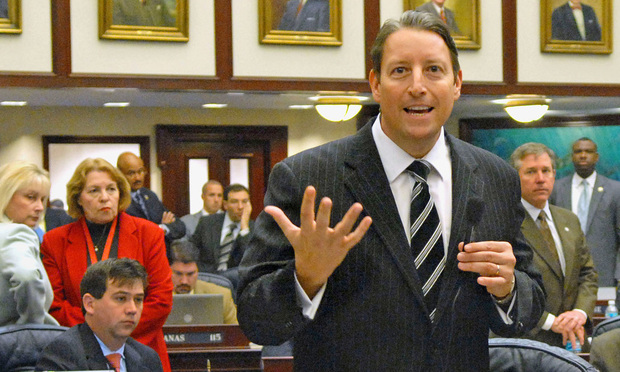Senate President Galvano Signals Workers' Comp Could Be on Table
Galvano said the laws need to be looked at because of two state Supreme Court rulings, including one that eliminated caps on fees charged by attorneys who represent injured workers.
November 21, 2018 at 02:22 PM
4 minute read
 Sen. Bill Galvano
Sen. Bill Galvano
New Senate President Bill Galvano is promising to revisit Florida's workers' compensation insurance laws, despite two decreases in rates for employers.
Galvano said the laws need to be looked at because of two state Supreme Court rulings, including one that eliminated caps on fees charged by attorneys who represent injured workers. He said there is a chance the rulings could result in rate hikes in the future.
“I don't want to be in a situation where they spike and then we are running to fix it at that point,” Galvano, R-Bradenton, told reporters Friday. “I'd rather look at the system and make any changes that are necessary while we have the luxury of not having high rates.”
Galvano, who formally took over as president Tuesday, would not say whether he would be willing to offer proposals that would affect employers and employees, saying that is “not a decision that has been made.”
His willingness to tackle workers' compensation insurance comes on the heels of an announcement this month by the state Office of Insurance Regulation that rates will go down an average of 13.8 percent in 2019. That follows a 9.5 percent average rate reduction this year.
While rates are being reduced, Bill Herrle, executive director of the National Federation of Independent Business in Florida, said that doesn't mean all problems are solved for employers who must buy the coverage.
“Dropping rates doesn't guarantee that all is well with workers' compensation. We're grateful that he sees that clearly,” Herrle said. “However, a good workers' compensation reform bill is always a heavy lift, no matter which direction rates are heading. Kudos to [Galvano].”
Workers' compensation insurance proposals are difficult to pass because of the various interest groups, including business groups, health-care providers who are paid to treat injured workers and plaintiffs attorneys who are sometimes hired to represent workers.
At a minimum, there is usually a divide between business groups and plaintiffs' attorneys, many of which are represented by the Florida Justice Association.
Business groups argue that attorneys' fees drive up costs in the workers' compensation system, while plaintiffs' lawyers contend they help ensure injured workers can get needed representation in disputes with insurers.
The Republican-dominated Legislature in 2003 passed a sweeping rewrite of the workers' compensation system that, among other things, tied the recovery of worker attorneys' fees to percentages of the amounts of recovered benefits. The law was tweaked in 2009 to make clear that workers' compensation judges were precluded from awarding additional hourly fees for plaintiffs' attorneys.
But in a 2016 ruling known as Castellanos v. Next Door, the Florida Supreme Court struck down the fee caps as unconstitutional.
Ryan Banfill, a spokesman for the Florida Justice Association, praised Galvano for agreeing to tackle workers' compensation insurance and listed a number of issues the association is interested in pursuing, including increased choice of medical providers for injured workers. Florida has a managed-care mandate for workers' compensation insurance, which limits the physicians who workers can see for treatment.
“Safe workplaces throughout Florida depend on state leaders like President Galvano to take a thorough, measured, and responsible examination of the workers' compensation insurance system,” Banfill said in a statement. “As someone who has fought to accomplish common-sense, comprehensive and constitutional reforms across his tenure in state government, Senator Galvano is in an excellent position to create meaningful and enduring changes that make the safety of Floridians a principle that is coequal to workable solutions to employers.”
Christine Sexton reports for the News Service of Florida.
This content has been archived. It is available through our partners, LexisNexis® and Bloomberg Law.
To view this content, please continue to their sites.
Not a Lexis Subscriber?
Subscribe Now
Not a Bloomberg Law Subscriber?
Subscribe Now
NOT FOR REPRINT
© 2025 ALM Global, LLC, All Rights Reserved. Request academic re-use from www.copyright.com. All other uses, submit a request to [email protected]. For more information visit Asset & Logo Licensing.
You Might Like
View All
Meta agrees to pay $25 million to settle lawsuit from Trump after Jan. 6 suspension
4 minute read
Executive Assistant, Alleging Pregnancy Discrimination and Retaliation, Sues Florida Healthcare Entrepreneur
3 minute read
Trending Stories
Who Got The Work
J. Brugh Lower of Gibbons has entered an appearance for industrial equipment supplier Devco Corporation in a pending trademark infringement lawsuit. The suit, accusing the defendant of selling knock-off Graco products, was filed Dec. 18 in New Jersey District Court by Rivkin Radler on behalf of Graco Inc. and Graco Minnesota. The case, assigned to U.S. District Judge Zahid N. Quraishi, is 3:24-cv-11294, Graco Inc. et al v. Devco Corporation.
Who Got The Work
Rebecca Maller-Stein and Kent A. Yalowitz of Arnold & Porter Kaye Scholer have entered their appearances for Hanaco Venture Capital and its executives, Lior Prosor and David Frankel, in a pending securities lawsuit. The action, filed on Dec. 24 in New York Southern District Court by Zell, Aron & Co. on behalf of Goldeneye Advisors, accuses the defendants of negligently and fraudulently managing the plaintiff's $1 million investment. The case, assigned to U.S. District Judge Vernon S. Broderick, is 1:24-cv-09918, Goldeneye Advisors, LLC v. Hanaco Venture Capital, Ltd. et al.
Who Got The Work
Attorneys from A&O Shearman has stepped in as defense counsel for Toronto-Dominion Bank and other defendants in a pending securities class action. The suit, filed Dec. 11 in New York Southern District Court by Bleichmar Fonti & Auld, accuses the defendants of concealing the bank's 'pervasive' deficiencies in regards to its compliance with the Bank Secrecy Act and the quality of its anti-money laundering controls. The case, assigned to U.S. District Judge Arun Subramanian, is 1:24-cv-09445, Gonzalez v. The Toronto-Dominion Bank et al.
Who Got The Work
Crown Castle International, a Pennsylvania company providing shared communications infrastructure, has turned to Luke D. Wolf of Gordon Rees Scully Mansukhani to fend off a pending breach-of-contract lawsuit. The court action, filed Nov. 25 in Michigan Eastern District Court by Hooper Hathaway PC on behalf of The Town Residences LLC, accuses Crown Castle of failing to transfer approximately $30,000 in utility payments from T-Mobile in breach of a roof-top lease and assignment agreement. The case, assigned to U.S. District Judge Susan K. Declercq, is 2:24-cv-13131, The Town Residences LLC v. T-Mobile US, Inc. et al.
Who Got The Work
Wilfred P. Coronato and Daniel M. Schwartz of McCarter & English have stepped in as defense counsel to Electrolux Home Products Inc. in a pending product liability lawsuit. The court action, filed Nov. 26 in New York Eastern District Court by Poulos Lopiccolo PC and Nagel Rice LLP on behalf of David Stern, alleges that the defendant's refrigerators’ drawers and shelving repeatedly break and fall apart within months after purchase. The case, assigned to U.S. District Judge Joan M. Azrack, is 2:24-cv-08204, Stern v. Electrolux Home Products, Inc.
Featured Firms
Law Offices of Gary Martin Hays & Associates, P.C.
(470) 294-1674
Law Offices of Mark E. Salomone
(857) 444-6468
Smith & Hassler
(713) 739-1250







